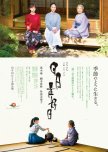"On a rainy day, listen to the rain. Savor the moment with all five senses, with your whole body. On a snowy day, look at the snow. In summer, feel its heat. In winter, the freezing cold. 'Every day a good day.' So that's what it means!"
I do appreciate it when a film does not rely on emotional manipulation techniques to transmit a heartfelt stimulation. The emotions provoked are more genuine and authentic, rather than forced and assaulting. I do despise it when a film forces a melodrama only for the sake of breaking a heart, without having your soul or innermost being be moved.
This film is like the former for me. It didn't break neither moved my heart, but it really spoke to me: quiet, delicate, but so profound. This was a walking still life: food, nature, almost rugged, yet, so mellow. You might shed a tear or two not because you felt emotional nor understood, but because you can somehow learn a simple thing about life. It is not about being understood, but acquiring some understanding that evokes the greatest humanity inside of us.
Instead of the film displaying a hyperbole of feelings, the rhythm of rain weighed heavier as it climaxed. The wraiths of wisdom wrung by the waterfall—don't read the characters (letters); see them as pictures. The rottenness and fruitfulness of her romances were portrayed rather vaguely. We have never seen the facade of her lovers neither the redness of a relationship, but we have witnessed the unaffected train leaving her in her sombre solitude; the heat of the sun callously flooding her room in the depth of her depression; and the warmth of the sun finally embracing the entirety of her cheek as she walked with her newfound love.
Science says that water possesses negative ions that enhance mental and emotional health. Even spiritual notions hold water as a vital healing matter. As such, we could see from the film how water affected the characters, especially Noriko. She always found herself in the sea, the river stream, or even drinking from a sōzu (water fountain) during the toughest times of her life. As if the flowing waters spoke for her when she could not find the words or exact expression to expound what she thinks or feels.
The epilogue scene was New Year's day. In spite of the numerous times that the winter season was shown or talked about in the film, this is the only time that falling and covered snow was in sight. There was only rain and sunshine before, but now she has snow. As the new year changed, the old seasons withered away and Noriko has changed as well, except for one thing, she still goes to Tea every Saturday.
Noriko was portrayed to be slow and almost overly analytical. Perhaps, inside her mind was where her real world was. Though, learning about tea has changed her as a person; and now each time she could not find life, going to the teahouse gave her renewal and refreshment.
"By teaching, you are taught."
"Perhaps, my real beginning comes now."
I do appreciate it when a film does not rely on emotional manipulation techniques to transmit a heartfelt stimulation. The emotions provoked are more genuine and authentic, rather than forced and assaulting. I do despise it when a film forces a melodrama only for the sake of breaking a heart, without having your soul or innermost being be moved.
This film is like the former for me. It didn't break neither moved my heart, but it really spoke to me: quiet, delicate, but so profound. This was a walking still life: food, nature, almost rugged, yet, so mellow. You might shed a tear or two not because you felt emotional nor understood, but because you can somehow learn a simple thing about life. It is not about being understood, but acquiring some understanding that evokes the greatest humanity inside of us.
Instead of the film displaying a hyperbole of feelings, the rhythm of rain weighed heavier as it climaxed. The wraiths of wisdom wrung by the waterfall—don't read the characters (letters); see them as pictures. The rottenness and fruitfulness of her romances were portrayed rather vaguely. We have never seen the facade of her lovers neither the redness of a relationship, but we have witnessed the unaffected train leaving her in her sombre solitude; the heat of the sun callously flooding her room in the depth of her depression; and the warmth of the sun finally embracing the entirety of her cheek as she walked with her newfound love.
Science says that water possesses negative ions that enhance mental and emotional health. Even spiritual notions hold water as a vital healing matter. As such, we could see from the film how water affected the characters, especially Noriko. She always found herself in the sea, the river stream, or even drinking from a sōzu (water fountain) during the toughest times of her life. As if the flowing waters spoke for her when she could not find the words or exact expression to expound what she thinks or feels.
The epilogue scene was New Year's day. In spite of the numerous times that the winter season was shown or talked about in the film, this is the only time that falling and covered snow was in sight. There was only rain and sunshine before, but now she has snow. As the new year changed, the old seasons withered away and Noriko has changed as well, except for one thing, she still goes to Tea every Saturday.
Noriko was portrayed to be slow and almost overly analytical. Perhaps, inside her mind was where her real world was. Though, learning about tea has changed her as a person; and now each time she could not find life, going to the teahouse gave her renewal and refreshment.
"By teaching, you are taught."
"Perhaps, my real beginning comes now."
Considerați utilă această recenzie?


















